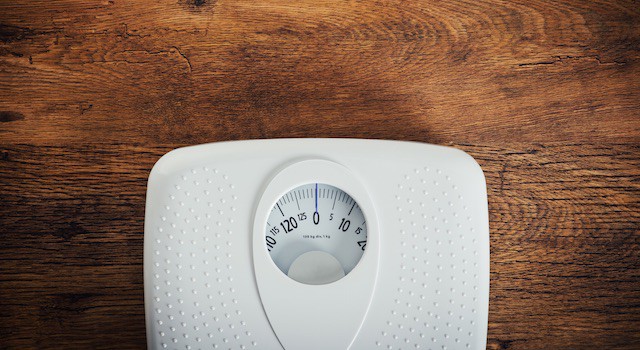"An estimated 95 percent of people using diets and lose weight, then take it again." - Brian Wansink in "food without rhyme or reason"
When I read this statement, I was, on the one hand, shocked. In 19 out of 20 cases, diets are only temporary. On the other hand, I had experienced these ups and downs in body weight first hand. It just happens a lot more often than I expected. This phenomenon is called the yo-yo effect, which Wikipedia defines as follows:
“The yo-yo effect is an undesirable and rapid weight gain after a weight loss diet. With repeated diets, the body weight can move up and down like a yo-yo, with the new final weight often being higher than the starting weight. "
In this post, I want to tell you about my two big diets. The first time I felt the yo-yo effect with full force. After the second diet, the yo-yo was picking up a lot of momentum when I realized what I was doing wrong. From these experiences, I learned how to avoid the ups and downs of my bodyweight today.
TWO DIETS AND ONE AND A HALF YO-YO EFFECTS
It has been a while since my first big diet. I was 17 years old then. I don't remember exactly how much I weighed, but it must have been between 110 and 120 kilograms. For a few months, I cut my calorie intake significantly. I went jogging a few times but mostly starved myself to normal weight.
The success did not last long, however. After I reached a weight of 88 kilograms, which was good for me, I started eating more again. Mostly the same things as before. After a few months, the tightest T-shirts and pants no longer fit. In the following year, I did another good job in the Bundeswehr. During basic training, I ate the candy to cope with stress, then out of boredom.
In the ten years after my big diet, my weight kept increasing. I had never bought a bathroom scale and on purpose, I stopped weighing. When I finally faced the truth, I weighed 150.6 kilograms. At the time, I was almost 28 years old and was starting my second major diet.
How To Get Rid Of Belly Fat Fast And Permanently

From one day to the next, I cut all unhealthy foods from my menu, but also everything else that smelled of calories. I learned to deal with hunger and felt proud when I ended a day with a growling stomach. I also did a lot of sports. At first, I sweated on the cross trainer, later jogging in the woods, playing basketball and soccer. I did anything that burned calories. I lost 60 kilograms in nine months.
This time I wanted to avoid the yo-yo effect. Although I increased my energy intake again, I ate significantly less than before the diet and forced myself to starve briefly. Sometimes I skipped meals when it came up and kept doing exercise. I got used to running. Jogging five times a week was not the exception, it was the rule. I didn't even start walking under ten kilometers, because it was (felt) not worth it. At that time I ran several half marathons. I wanted to run away from the yo-yo effect.
But I didn't succeed. I slowly gained weight again. On average only 250 grams per month. But what sounds like little, adds up to 12 kilograms after four years. Starving a little was no good. Continuous jogging was of no use and calories didn't count either. I was afraid of getting fat again - until I changed a few things. I will come to these later. First, let me show you what I was doing wrong up to then.
WHY I COULDN'T PREVENT THE YO-YO EFFECT
In retrospect, I know why I couldn't keep my weight. It's the same reasons why 19 out of 20 diets end up with the yo-yo effect. I believed in the wrong things like starving yourself, counting calories and exercising. They may be useful for short-term weight loss, but they do not help me maintain my weight after a diet. Let's take a look at my mistakes in detail.
1. I HAD RADICALLY REDUCED MY ENERGY INTAKE
I was highly motivated during my diets. I wanted to lose as much weight as possible as soon as possible. I suspect that is the case with many people who want to lose weight. If we are already in the river, it cannot go fast enough. We want to get past the diet quickly, after all, being overweight bothers us and diets are not fun. We want to be slim and then be able to eat normally.
To a certain extent, this works well. If we starve enough, the body will eventually break down fat. But that is only a consequence of energy reduction. Another is that the body independently reduces its energy consumption due to the fewer calories it consumes. Then our body temperature drops slightly, we feel weak and maybe in a bad mood. In this state, the body gets by with fewer calories. He has lowered his needs himself and is getting used to this level. We, therefore, have to eat even less to lose weight.
But it doesn't end here. The energy requirement also decreases because the body breaks down muscles during a diet (more on this in a moment), which otherwise burn a lot of energy. In addition, it needs less energy as soon as we have lost some weight because now less mass has to be supplied.
This means that with every diet, the basal metabolic rate - the energy that we consume while resting - decreases for three reasons:
- When we consume less energy, we automatically useless.
- We lose some of our muscle mass.
- We burn less energy because we weigh less.
Therefore, the basal metabolic rate is so low in some Dauerdiätern that these people no longer take-off can. Some even gain weight again from little food.
Something similar - albeit less dramatic - was at the end of my diet. I had starved radically and thus reduced my energy requirements without wanting to. Then I regained weight, even though I wasn't eating too much.
2. I DID THE WRONG SPORT
When I lost 60 kilograms, I was not only rid of my fat, but also some of my muscle mass. When dieting, the body first breaks down muscles, because these consume valuable energy (which we take from the body when starving). This is the most important reason why the body's energy needs decrease.
He holds on to the fat pads as an iron reserve for longer. Mark Maslow (from Marathonfitness) estimates that we can only lose 250 to 750 grams of fat per week - depending on how high our body fat percentage is. If you lose more than 750 grams in a week, you probably have a good portion of muscle mass.
You can only maintain and build muscles by using them. But I didn't do that or not enough. I did sport but concentrated on jogging. I felt like I could burn off more energy in an hour of running than with other sports. That may even be true, but I ignored the 23 hours of the day when I wasn't running.

Maybe I burned an additional 500 calories jogging, but dieting also caused me to lose muscle mass, which reduced my basal metabolic rate. If I had done weight training instead, my energy consumption in one hour would probably have been less than when jogging, but I would have saved or even built my muscles and benefited from a higher basal metabolic rate. Today I know that jogging is not a good way to lose weight .
Almost everyone who wants to lose weight makes this mistake. You only pay attention to the calories they the burn sports, but not to the energy they consume in the rest period (because this is less tangible).
3. I COULD NOT KEEP UP THE REDUCTION PERMANENTLY
I had lost weight with a method that had to end at some point. This is also one of the most common mistakes. Diet is considered to be temporary.
Later on, I tried to maintain my diet in small pieces by constantly watching how much I was eating, even when I was still hungry or hungry, and sometimes going to bed hungry. I also jogged five times a week. But does that sound like something that can be held out forever? No. This way of life is associated with too much willpower for that. This in turn is finite. If on an ordinary day other things get on my nerves or I have little time, I let myself down. If I do this a few times in a row, a few exceptions will become a new habit.
We humans are not made for reduction, renunciation, and self-discipline. At some point, we break-in.
4. I ATE THE WRONG THING
After my diet, I ate less but hardly healthier than before. I hadn't really changed my eating habits. I was just trying to eat as few calories as possible, because this calorie thinking has been the only truth ingrained into all of us for decades. I had never heard of the fact that calories can vary in quality.
Unknowingly, I ate mostly low-quality calories. These tend to land in my fat pads, which I am very prone to. Having been fat for most of my life, my fat cells are still there and ready to take in. If I feed them unhealthy foods, I will quickly become fat again. In addition, I am less full of this and consequently have to starve in order not to gain weight - a condition that I cannot endure permanently.
If I eat a similar unhealthy diet after a diet as I did before a diet, my body automatically reverts to its initial weight. I cannot take countermeasures with willpower alone. Find out why this is the case and what this has to do with good and bad calories.
HOW TO AVOID THE YO-YO EFFECT TODAY
So far, the situation sounds pretty hopeless and it becomes clear why 95 percent of diets end in the yo-yo effect. But there are solutions. I'm happy about that because more than a year ago my weight dropped again without starving or jogging. Since then, I've kept it pretty stable. It does fluctuate slightly, but I know which adjusting screws I have to turn.
1. I DON'T DIET ANYMORE
The word "diet" comes from the Greek and originally meant "way of life". Today we mean reduction, renunciation, starvation. We try to reduce our weight with a temporary show of strength and then maintain it with a different diet. Any diet as we understand it today is doomed to failure.
Instead, the diet we use to lose weight must also be the one we use to keep the weight off. In other words, we have to establish habits during the diet that we will maintain after the diet. In fact, there is no such thing as “during” and “after” the diet. There is not even a diet, but a new way of life.
The healthier this lifestyle, the more excess fat the body breaks down. Depending on the quality of the diet, it will automatically level off at a new weight. If this is still too high for you, the answer is not to eat less, but to eat healthier. To be able to believe in this solution, we have to understand that the body reacts independently to what we add to it. T. Colin Campbell describes it very well in his book "China Study":
"Give your body the right food and it will start the right thing".
A new way of life requires a new attitude towards nutrition. It has to become a matter of course that we don't drink cola, don't grab the fries cones on the go, and don't snack on the fatty potato chips in front of the television in the evening. For me, it has become. Today I have new standard solutions for my diet. Cola, chips & Co. are absolute exceptions that I don't miss on an ordinary day.

With such a way of life, I solved three of the above problems :
- I no longer go hungry, so my basal metabolic rate remains stable.
- I no longer eat the wrong thing, but rather healthy. If I want to lose a few more kilograms, I have to eat healthier (and know-how).
- I can keep up this way of life in the long term because I am convinced of it and no longer squint at Cola, French fries & Co. It is based on habits that are firmly integrated into my everyday life.
By the way: If you have already been on a radical diet and want to maintain your weight, it is not too late for you. While it would have been better to lose weight through a healthy lifestyle, you can still start now. Follow the next two steps to do this.
2. I EAT HEALTHIER
I have already mentioned several times that I have lost weight and maintained my weight through a healthier diet, but without saying what I mean by that.
As a regular reader, you already know that. For new readers, I would like to refer you to previous articles. A while ago I wrote about Five Little Changes That Can Make a Big Impact on Your Diet. These five changes are:
- I drink almost exclusively water
- In between meals, I mainly snack on fruits and vegetables
- My breakfast is hearty, not sweet
- I make desserts and cakes exceptional
- I eat real foods and prepare them myself
Most of the changes have meant consuming less sugar.
With a healthy diet, I don't have to go without calories. I can eat enough to feel full and give my body enough energy to maintain its basal metabolic rate. By and large, I can maintain this diet over the long term. I sometimes deviate from it because my environment is full of unhealthy temptations, but I always find my way back to my habits. It's okay for me to eat only 80 percent healthy.
I find it easier to eat healthily when I cook myself.
3. I MOVE AND BUILD MUSCLES
My new way of life includes a healthy amount of exercise. That means moving my body enough in everyday life to keep my metabolism going, even without exercise. A positive side effect is that with more physical exercise, you burn more energy that cannot be stored in the fat cells.
Movement in everyday life has become difficult as many of us drive to work to sit in front of a computer for eight hours. Those who work in an office move on average far less than they should. I recently described in another article how I changed my awareness of movement despite working from home.

I maintain a minimum level of fitness with daily exercise. But I want to do more. I want to build muscles in order to increase my basal metabolic rate sustainably so that my body burns more energy even when I am lying on the sofa. That's why I do weight training twice a week. Originally, I did this at home after looking for a few exercises on the Internet.
However, I found that it is difficult to integrate weight training on your own as a sustainable lifestyle in my everyday life. The overcoming was great, so there was always the risk of missing a training session. That is why I have been taking part in regular courses for nine months, in which various training concepts (Bootcamp, TRX, Training for Warriors, Lets Bands) are offered. There I do strength/endurance training that makes me feel fitter than ever. I was able to build up additional muscle mass, which now burns some of the energy from my food. I rarely go jogging because I see my time is better spent in strength and endurance sports.
These three points are my "secret" against the yo-yo effect. But not just mine! I assume that 5 percent of people who do not regain weight after dieting has internalized these things:
- They lose weight by having a healthy lifestyle that they maintain throughout their lives.
- This healthy lifestyle includes real foods and low sugar.
- You move around a lot and build muscle mass.
Such a lifestyle change is not easy. It doesn't leave overnight because it has new habits associated with it. But as far as I know, it is the only way to avoid the yo-yo effect after losing weight. It works for me and I hope you will give it a chance. Either way, it certainly doesn't hurt to opt for a healthy diet and more exercise. I wish you great success!
